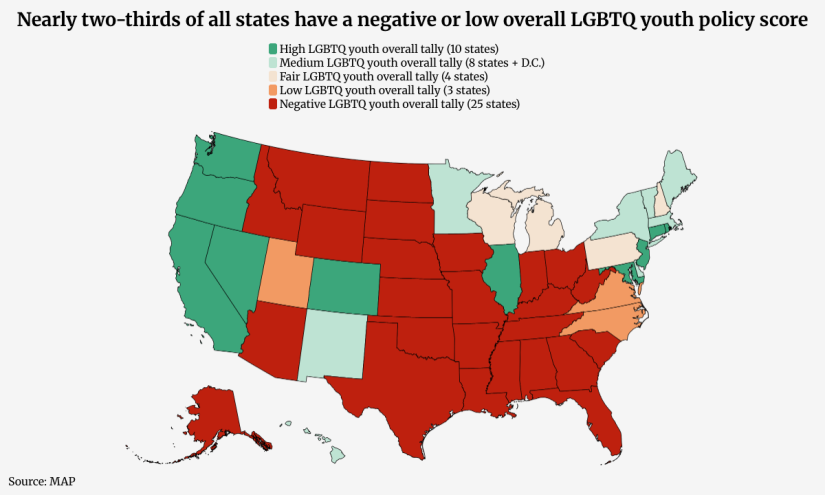Even as the number of youths who identify as LGBTQ rises, so has the number of state-level bills seeking to curtail their rights, a new analysis finds.
The number of bills aimed at rolling back or prohibiting in-school protections and health care access has tripled from 77 in 2020 to some 300 a year in 2023, 2024 and 2025, according to the Movement Advancement Project.
The drumbeat of legislation, report the researchers, has taken a steep toll on the mental health of the students in the crosshairs — regardless of where they live. When the dramatic escalation in legislation started in 2023, 90% of LGBTQ people ages 13 to 24 said politics had a negative impact on their well-being — up from 71% in 2022.
Policies enabling in-school support are particularly important to LGBTQ youth. Slightly more than half say they are accepted by peers or teachers at school, compared with 40% who are supported at home. The presence of even one supportive educator in a child’s life has long been shown to reduce rates of suicidality, anxiety and depression.
The number of young people impacted has risen sharply in recent years, though estimates vary depending on how data is tabulated. According to a recent Gallup survey, almost 2 million — or 9.5% — of teens ages 13 to 17 now identify as something other than straight or cisgender. That’s nearly twice as many as in 2020.
Kids don’t deserve to go through this shit
Nor do adults but the cruelty and death is the point.
They think if they can kill enough of us queers off then there will be no more of us but sexuality and gender doesn’t work that way.
I’m fairly confident that a significant portion of this current rash of bills is the result of parents who said “well, I mean i don’t care what other people do in the privacy of their own home, but if MY kid…” facing that their kid was in fact “…”, and not handling that well (ranging from being passive aggressive to trying to kidnap them to a conversion camp) and being cut out of the life of the kid, and then rather than examine their behavior towards their kid, just assumed it must be some outside actor driving them apart.
It’s not a majority of voters in any given state, but enough older, chronically misinformed, parents who are emotionally struggling with the fact that their kids won’t talk with them anymore, have ginned up a significant enough constituency to swinging state legislators.
State legislators are surprisingly easy to influence, they represent small enough constituencies (varies state to state) and constituents so rarely reach out to them, that talking with them about an issue can significantly alter their views, especially if they’ve never heard about the issue before.




